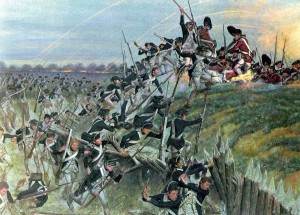Good morning, Whitewater.
Sunday in town will be partly cloudy with a high of fifty-seven.
Among respondents to Friday’s FW poll asking about a preference between summer and winter, a clear majority (78.95%) picked summer.

Storming of Redoubt #10. H. Charles McBarron – US Army Chief of Military Historians office. Via Wikipedia.
On this day in 1781, Lord Cornwallis’s forces formally surrender at Yorktown, effectively ending the Revolutionary War:
The fire on Yorktown from the allies was heavier than ever as new artillery pieces joined the line.[64] Cornwallis talked with his officers that day and they agreed that their situation was hopeless.[65]
On the morning of October 17, a drummer appeared followed by an officer waving a white handkerchief.[66] The bombardment ceased, and the officer was blindfolded and led behind the French and American lines. Negotiations began at the Moore House on October 18 between Lieutenant Colonel Thomas Dundas and Major Alexander Ross (who represented the British) and Lieutenant Colonel Laurens (who represented the Americans) and the Marquis de Noailles (who represented the French).[66] To make sure that nothing fell apart between the French and Americans at the last minute, Washington ordered that the French be given an equal share in every step of the surrender process.[66]
The articles of capitulation were signed on October 19, 1781.[66] Signatories included Washington, Rochambeau, the Comte de Barras (on behalf of the French Navy), Cornwallis, and Lieutenant Thomas Symonds (the senior Royal Navy officer present).[67] Cornwallis’ British men were declared prisoners of war, promised good treatment in American camps, and officers were permitted to return home after taking their parole. At 2:00 pm the allied army entered the British positions, with the French on the left and the Americans on the right.[66]
The British had asked for the traditional Honors of War (marching out with dignity, flags waving, muskets shouldered, and playing an enemy [American] tune as a tribute to the victors), but remembering that the British, on taking Charleston earlier in the war, had refused the Americans (under Benjamin Lincoln) the same privilege, Washington firmly denied their request. Consequently, the British and Hessian troops marched with flags furled, muskets reversed in shame, while according to legend the British drummers and fifers played the tune “The World Turn’d Upside Down” – actually a popular British marching tune of the time, and in line with custom, but curiously appropriate under the circumstances. The British soldiers had been issued new uniforms hours before the surrender and until prevented by General O’Hara some threw down their muskets with the apparent intention of smashing them. Others wept or appeared to be drunk.[68] In all, 8,000 troops, 214 artillery pieces, thousands of muskets, 24 transport ships, wagons and horses were captured.[69]
Cornwallis refused to meet formally with Washington, and also refused to come to the ceremony of surrender, claiming illness.[69] Instead, Brigadier General Charles O’Hara presented the sword of surrender to Rochambeau. Rochambeau shook his head and pointed to Washington.[70] O’Hara offered it to Washington, but he refused to accept it, and motioned to his second in command, Benjamin Lincoln, who had been humiliated by the British at Charleston, to accept it.[69] The British soldiers marched out and laid down their arms in between the French and American armies, while many civilians watched.[71] At this time, the troops on the other side of the river in Gloucester also surrendered.[72]
